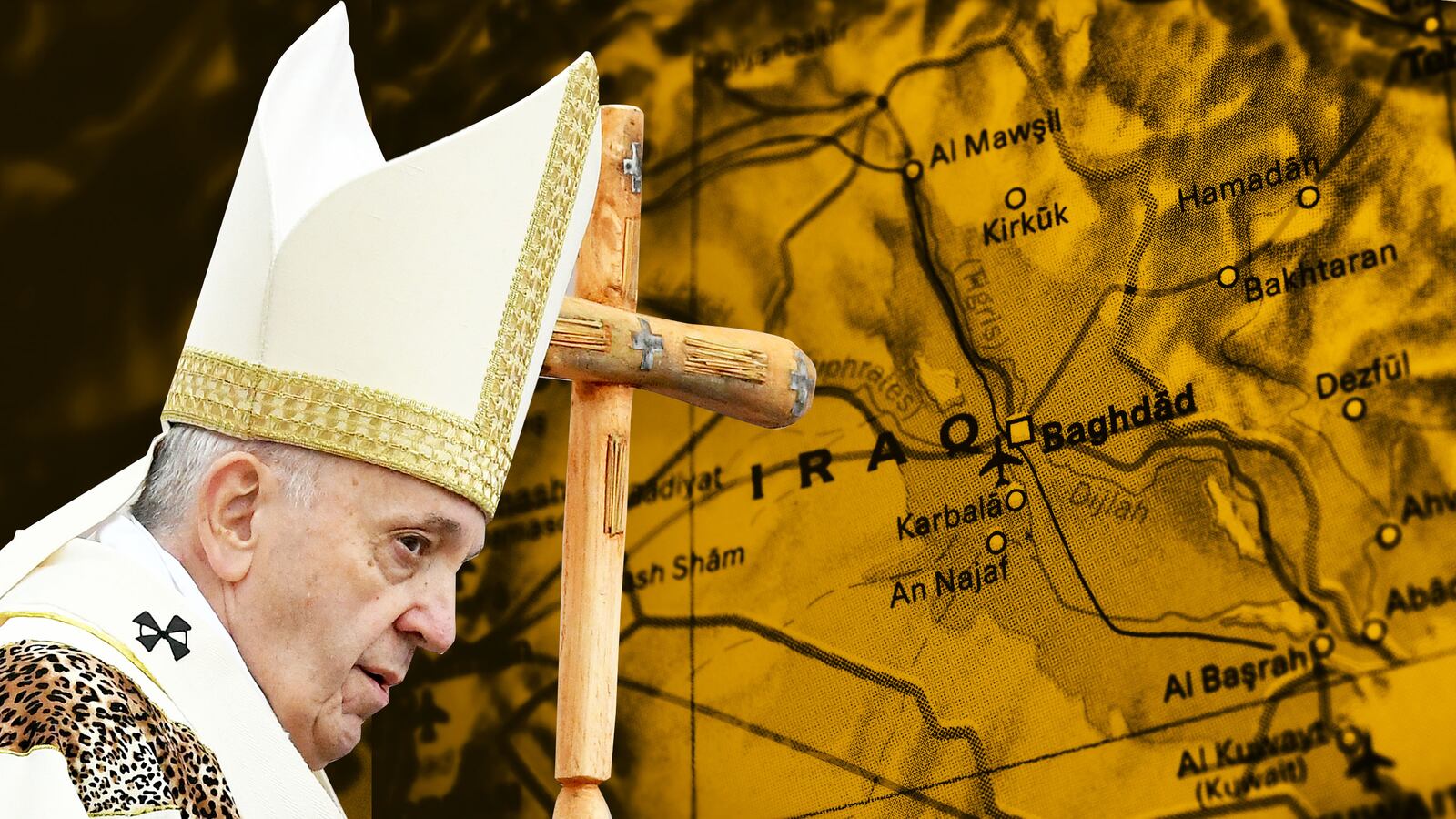ROME—Like people in the rest of the world, Pope Francis is clearly going a little stir-crazy staying cooped up at home during the COVID-19 pandemic. The globetrotting pontiff has been grounded since November 2019 when he visited Thailand and Japan. But if all goes to plan, Francis will hit the road again on March 5 with a four-day, six-city visit to Iraq, which has seen a spate in violence with three attacks on the U.S.-led coalition in the course of a week and a surge in coronavirus cases that sent the country into a strict two-week lockdown. The Iraq Health Ministry said the new wave is “being driven by religious activities—including Friday prayers and visits to shrines —and large crowds in markets, restaurants, malls and parks, where greetings with handshakes and kisses are the norm.”
Approximately 10,000 unvaccinated people are expected to gather together to attend a papal mass at the Franso Hariri stadium in Erbil.
The Vatican has taken extraordinary precautions to protect the papal entourage, offering everyone traveling with him, including the Vatican press corps, two doses of the Pfizer/BioNTech vaccine. The religious ceremony in Erbil will be held in a 50,000-seat venue only filled to 20 percent capacity but since Iraq isn’t expected to start its COVID-19 vaccine rollout until the first 3 million doses arrive in late February, it can be assumed that almost no one in the crowds will have been inoculated. The Vatican has not said whether negative COVID tests are required to attend any events.
The greatest threat to the pope may be the spike in violence in Baghdad, where he will land next Friday. Katyusha rockets landed inside the high-security Green Zone near the American embassy on Monday—the third time in a week. And on Feb. 15, another attack against the U.S.-led coalition forces near Erbil’s airport killed a civilian contractor and injured others.
But Iraqi Archbishop Bashar Matti Warda, who is working with Vatican secret service authorities ahead of the visit, says the anti-COVID measures in place might also keep the pope safe from attacks, since no one can enter areas where he is holding events without proper identification and assigned seating. This is designed to help with contact tracing in the event of a coronavirus outbreak. “God forbid any case would emerge,” he told the National Catholic Reporter. “We would know exactly where this person was and we could inform those around him or her that there was a case.”
Adrian Hyzler, chief medical officer for the international health, travel, and security company Healix International, told The Daily Beast that plans for the official stadium event fall in line with the rest of Europe and the U.S. in their approach to large attendance gatherings, including mask mandates and social distancing, so that could be relatively well-controlled. “However, we have all seen the huge crowds that follow papal visits,” he said. “And my greater concern would be for the uncontrolled masses of people that may gather around airports, the cathedral and the route.”
Hyzler fears those throngs of people lining the streets to try to catch a glimpse of the pope “may well ignore any advice to promote physical distancing and masking.” But he says testing in Iraq is being performed at a reasonable rate, though three times lower than in Italy, which has an aggressive rapid and molecular testing program in place that makes it easy for anyone to get tested.
Francis could use his global stage to promote vaccines, which the pope has called a “moral obligation” to put an end to the pandemic. The Vatican has also said that any employees refusing a vaccine are subject to dismissal. “The other important factors to consider are the hope and optimism that such a visit will engender as well as the potential for Pope Francis to promote the COVID vaccination campaign as a positive way to end the pandemic,” Hyzler says. “This could have a hugely beneficial effect on encouraging uptake of the vaccines when they are widely available to the Iraqi people.”
The pontiff himself said recently that he was aware of the risks. In an interview with the Catholic News Service in early February, he said he hoped many Iraqis would watch from home on television. “They will see that the pope is there in their country,” he said when asked why he was going on such a trip during a pandemic. “I am the pastor of people who are suffering.”
The Vatican has said they reserve the right to cancel the trip if things become too dangerous, but plans are moving forward in Iraq. Murals and posters are already up at many of the venues where he will be, according to posts popping up on social media. Joshua McElwee, Vatican correspondent and international news editor for the National Catholic Reporter, has had his vaccination ahead of the trip. He says bearing witness to the pope getting back on the road is an exciting opportunity. “I’m also very glad we will have an opportunity again to ask him some questions in the traditional press conference on the ride home,” he told The Daily Beast. The first question might just be: Was it worth it?






